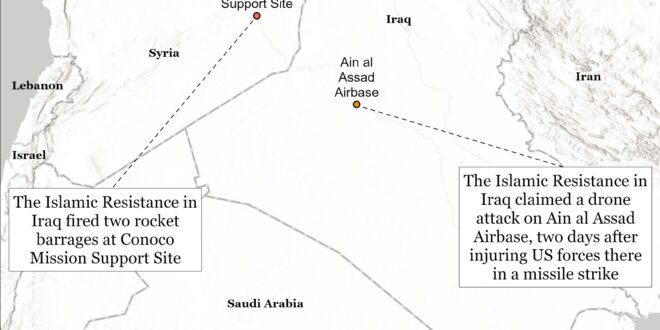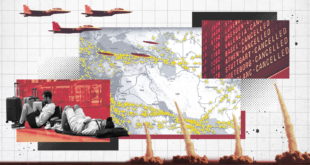Key Takeaways:
- The Southern Gaza Strip: Israeli forces “expanded” ground operations in Khan Younis to “dismantle” Hamas’ military forces in Khan Younis.
- The Northern Gaza Strip: Hamas and other Palestinian fighters are likely in the early stages of the reconstitution of their military and governance capabilities in the northern Gaza Strip.
- The West Bank: Israeli forces clashed with Palestinian fighters seven times across the West Bank on January 22.
- Northern Israel and Southern Lebanon: Lebanese Hezbollah conducted nine attacks from southern Lebanon into northern Israel on January 22.
- Iraq: The US Department of the Treasury’s Office of Foreign Assets Control sanctioned Iraqi airline Fly Baghdad for aiding the Islamic Revolutionary Guard Corps Quds Force and its militias in Iraq, Syria, and Lebanon. The Islamic Resistance in Iraq—a coalition of Iranian-backed Iraqi militias—claimed responsibility for three attacks targeting US positions in Syria and Iraq on January 22.
- Yemen: The Houthis claimed that they conducted a missile attack targeting an American military cargo ship in the Gulf of Aden on January 22.
- Iran: The Islamic Revolutionary Guards Corps (IRGC) held a funeral ceremony in Tehran on January 22 for three IRGC Quds Force officers that Israel killed in Syria. Israel’s strike on January 20 was a response to Iran’s efforts to accelerate its supply of military equipment to Hezbollah, which is using the equipment to support attacks into northern Israel.
Israeli forces “expanded” ground operations in Khan Younis to “dismantle” Hamas’ military forces in Khan Younis.[i] The IDF 98th Division is executing the “expanded” ground operation in western Khan Younis. Palestinian militias are continuing to execute a deliberate defense against the Israeli ground operation in western Khan Younis. Israeli media described the operation as the “fiercest battle” between the IDF and Palestinian militias.[ii] The operation aims to “dismantle” Hamas’ military forces in Khan Younis over “several days” by raiding Hamas outposts, “strongholds,” and capturing Hamas infrastructure.[iii] An Israeli military correspondent reported that the 98th Division isolated the Khan Younis Refugee Camp after airstrikes overnight on January 21 and 22.[iv] See the Gaza Strip Axis for more details on this development.
The IDF told the military correspondent that it is “aware of the sites where civilians are sheltering” in Khan Younis.[v] The IDF also told the Washington Post that it still considers Mawasi a “safer zone.”[vi] Israeli forces are operating along the easternmost edge of the al Mawasi Humanitarian Zone. See the Gaza Strip Axis for more details on this development.
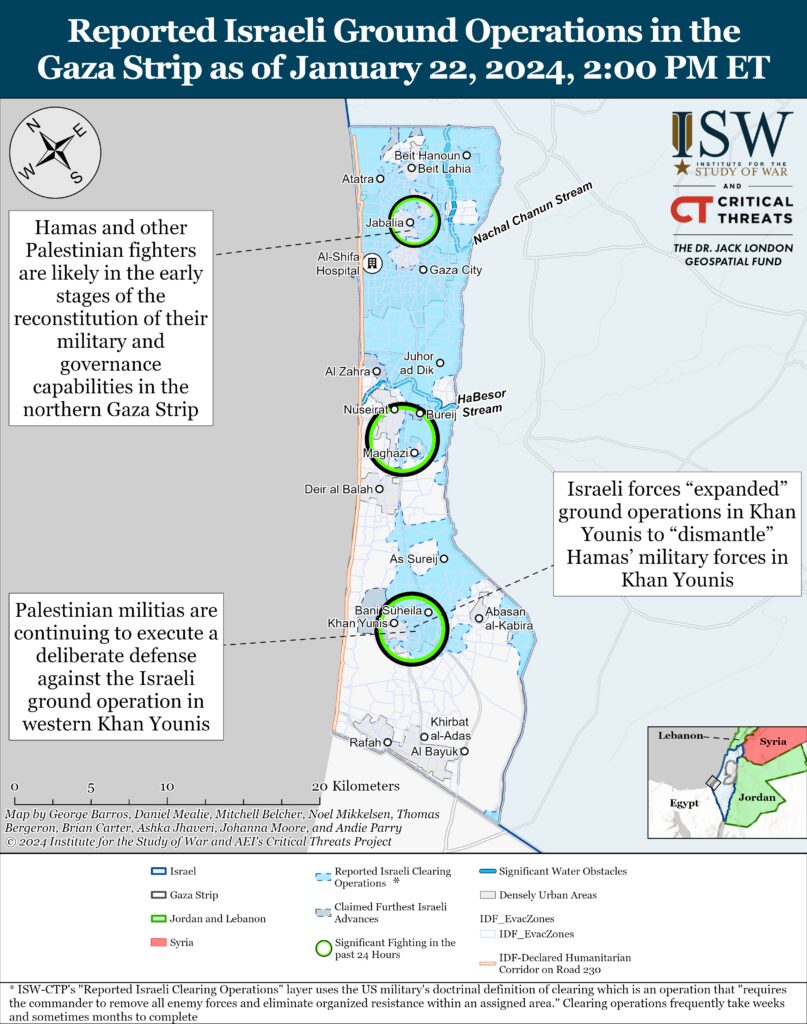
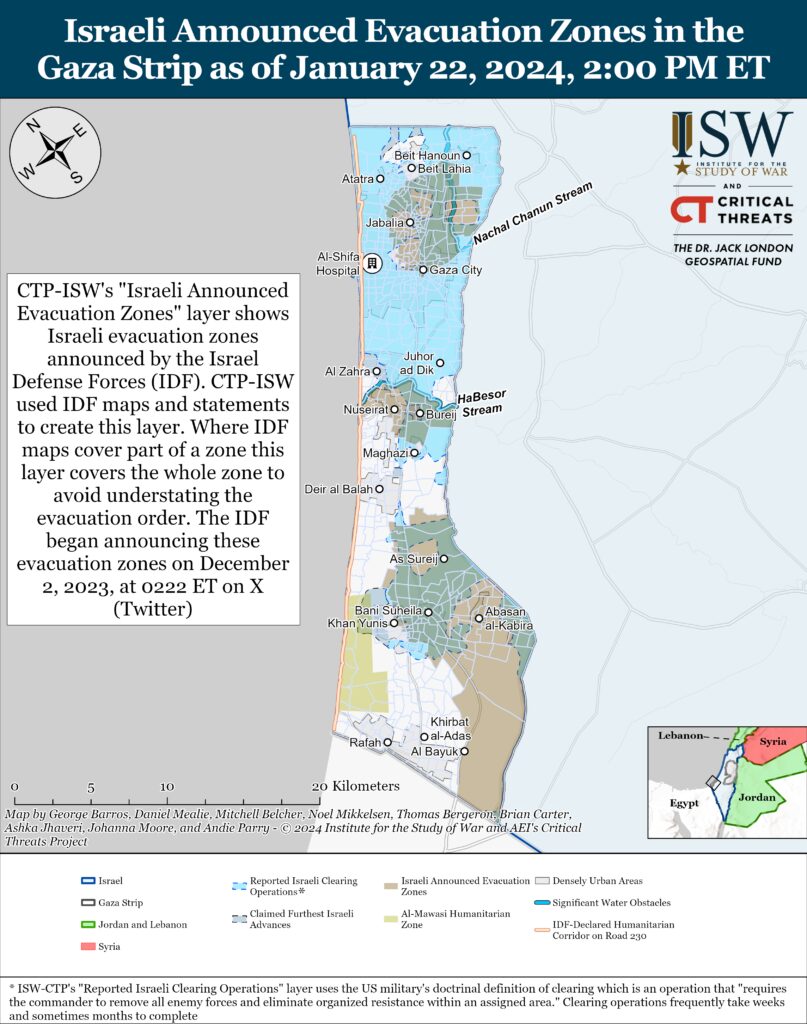
Hamas and other Palestinian fighters are likely in the early stages of the reconstitution of their military and governance capabilities in the northern Gaza Strip. The IDF has decreased its footprint in the northern Gaza Strip since December 31, which created an absence of authority in some areas of the Gaza Strip.[vii] There is no functioning civil authority in the northern Strip, which permits Hamas-backed governing structures to reemerge in some areas. The Israeli Army Radio’s military correspondent reported on January 16 that Hamas is attempting to reconstitute its local Police in the northern Gaza Strip and that the humanitarian aid arriving in the northern Strip comes immediately “into the hands of Hamas.”[viii]
Hamas and other Palestinian fighters are already contesting Israeli raids into the northern Gaza Strip, which indicates that Hamas is reconstituting some of its military capabilities. A local Gazan activist reported on January 20 that Israeli forces reentered the Strip east of Jabalia from the Gaza “envelope.”[ix] The Gaza Envelope describes populated areas in southern Israel that are within seven kilometers of the Israel-Gaza border. Hamas and other Palestinian fighters have engaged Israeli forces east of Jabalia since January 18, when Hamas claimed five attacks targeting Israeli forces.[x] Palestinian Islamic Jihad (PIJ), a Palestinian Islamist group backed by Iran and aligned with Hamas, mortared an Israeli supply line east of Jabalia in a combined operation with Hamas fighters on January 22.[xi] PIJ fighters also fired small arms at an Israeli combat outpost near the Eastern Cemetery east of Jabalia on January 22.[xii]
Hamas and other Palestinian militias are also reconstituting militarily elsewhere in the northern Gaza Strip. Local Gazan activists and journalists reported heavy fighting in Tel al Hawa near the al Katiba Square in southwestern Gaza City on January 21.[xiii] Israeli forces are continuing to conduct operations in southern Gaza City, as CTP-ISW has previously reported.[xiv]
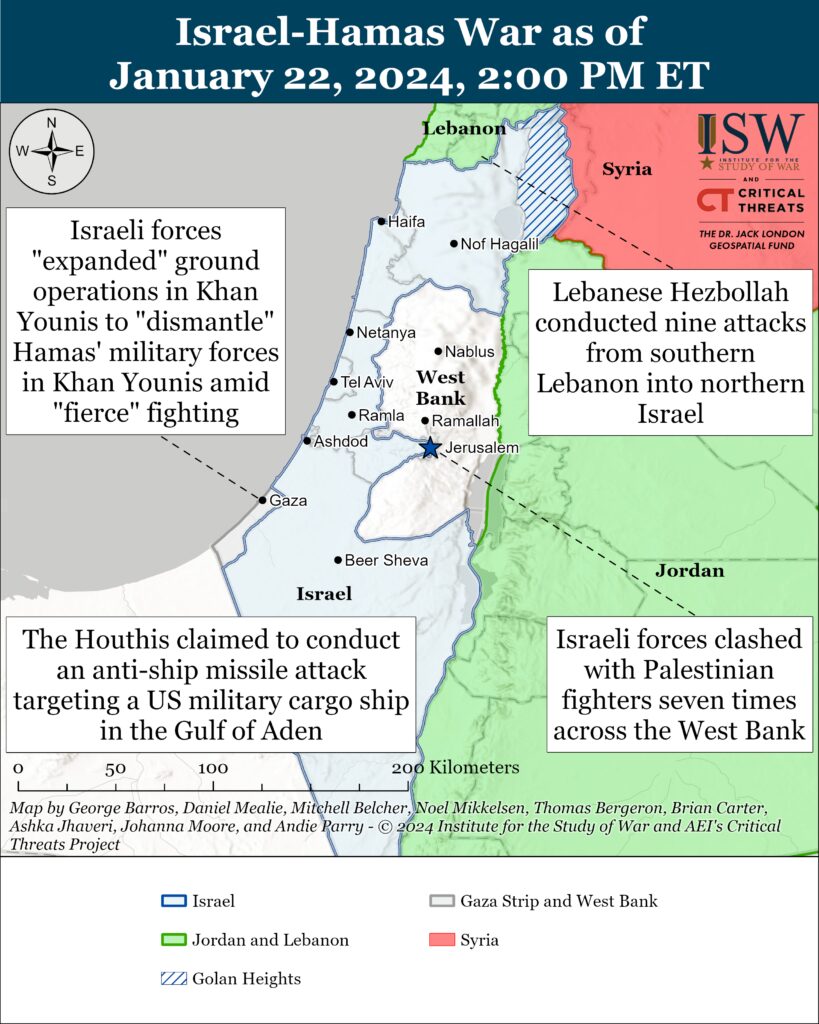
Gaza Strip
Axis of Resistance campaign objectives:
Erode the will of the Israeli political establishment and public to launch and sustain a major ground operation into the Gaza Strip
Degrade IDF material and morale around the Gaza Strip.The IDF Yiftach Brigade engaged two Hamas cells in the central Gaza Strip on January 22.[xv] The IDF said that the brigade killed both groups of Hamas fighters.
The Palestinian Islamic Jihad (PIJ)’s military wing claimed two attacks targeting Israeli forces in the central Gaza Strip on January 22. PIJ published a video on January 22 that showed its fighters firing a sniper rifle from a hide site targeting several Israeli soldiers east of Bureij.[xvi] PIJ also launched one Badr-1 rocket targeting Israeli soldiers east of Maghazi.[xvii] The Democratic Front for the Liberation of Palestine (DFLP), a leftist Palestinian militia aligned with Hamas in this war, ambushed an Israeli infantry unit that breached a house in Bureij on January 22.[xviii]
The IDF withdrew the 900th “Kfir” Brigade from Bani Suheila for a “short [rest and recuperation] and training period.”[xix] Unspecified Israeli forces backfilled the brigade. An Israeli military correspondent reported that the Kfir Brigade will resume its operations according to the IDF’s requirements.
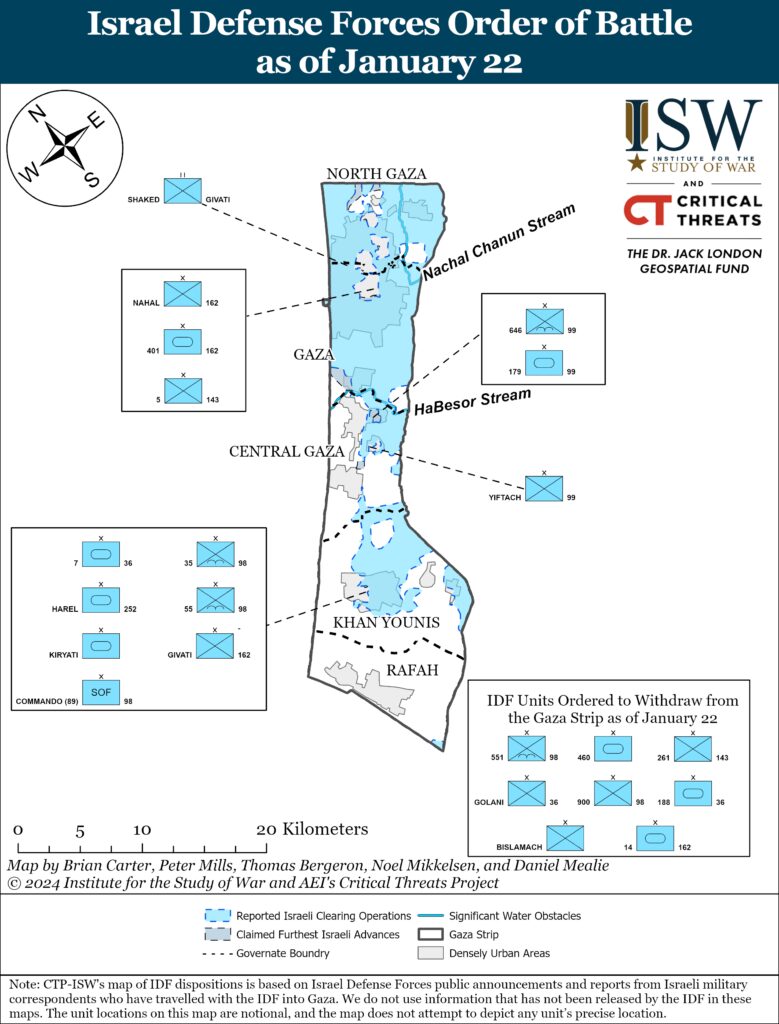
For Israel’s “expanded” operation in Khan Younis, see topline.
Palestinian militias are continuing to execute a deliberate defense against the Israeli ground operation in western Khan Younis amid the IDF’s “expanded” ground operation in Khan Younis. Palestinian militias claimed 11 attacks targeting Israeli forces in western Khan Younis city.[xx] Israeli media and Palestinian militias both reported “fierce” combat in western Khan Younis on January 22.[xxi] The DFLP claimed that it clashed with Israeli forces near al Aqsa University, which is on the edge of the al Mawasi Humanitarian Zone.[xxii] The al Aqsa Martyrs’ Brigade, which is a nationalist militia aligned with Hamas in this war, also said that it engaged Israeli forces operating in the Austrian Quarter, near Nasser Hospital.[xxiii] Local Palestinian sources also claimed that IDF armor deployed “near” Nasser Hospital in western Khan Younis.[xxiv]
Protesters and relatives of the hostages stormed the Israeli Knesset to demand the government do more to secure the release of the hostages held in the Gaza Strip on January 22.[xxv] Knesset security staff were unable to prevent the entry of protesters to the Knesset Finance Committee session. Many protesters wore photos of family members being held in the Gaza Strip on their shirts. This protest follows an earlier demonstration calling for new elections outside the Knesset on Monday morning.[xxvi] Non-voting Israeli war cabinet member Gadi Eisenkot stated on January 19 that the only way to secure the release of the hostages is with a ceasefire.[xxvii]
West Bank
Axis of Resistance campaign objectives:
Draw IDF assets and resources toward the West Bank and fix them thereIsraeli forces clashed with Palestinian fighters seven times across the West Bank on January 22.[xxviii] This number of attacks is consistent with the daily attack rate over the past week. The military wing of the Popular Front for the Liberation of Palestine—the Abu Ali Mustafa Brigades—claimed on January 22 that it conducted a combined attack with the al Aqsa Martyrs’ Brigades south of Jenin. This is the group’s first attack in the West Bank since October 12.[xxix]
Israeli forces arrested 15 wanted individuals in raids across the West Bank.[xxx]
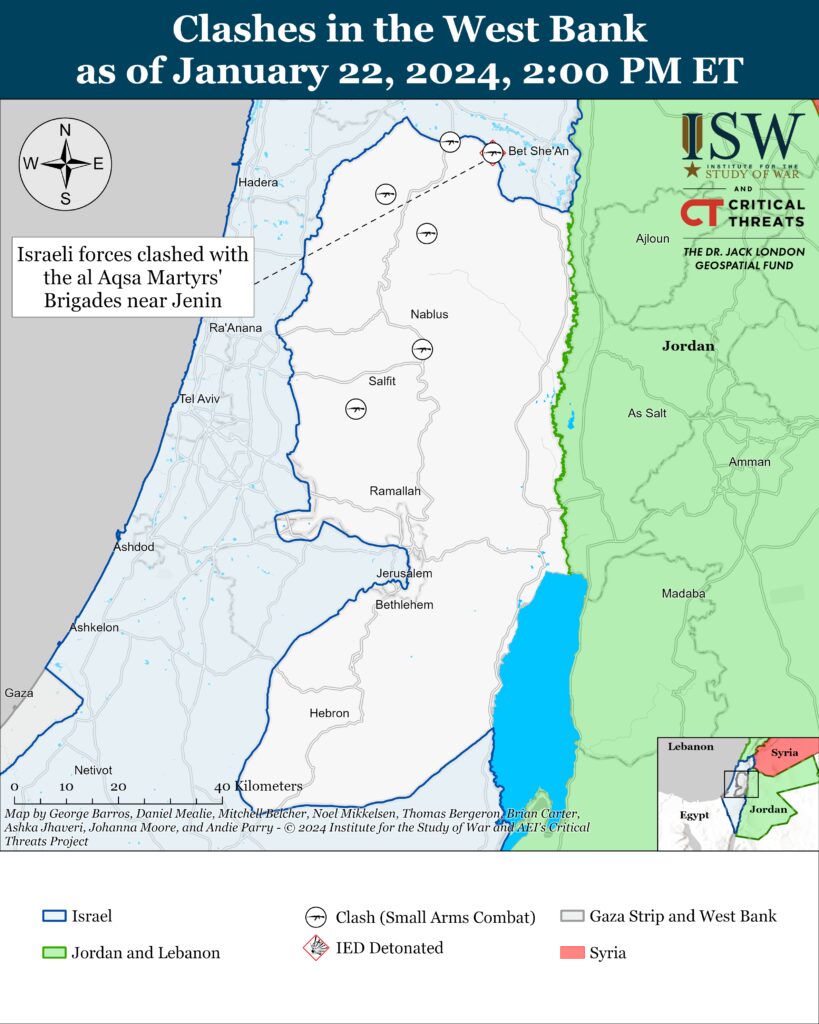
This map is not an exhaustive depiction of clashes and demonstrations in the West Bank.
Southern Lebanon and Golan Heights
Axis of Resistance campaign objectives:
Draw IDF assets and resources toward northern Israel and fix them there
Set conditions for successive campaigns into northern IsraelLebanese Hezbollah conducted nine attacks from southern Lebanon into northern Israel on January 22.[xxxi] The Israeli Air Force responded by striking Lebanese Hezbollah military infrastructure in multiple areas in southern Lebanon.[xxxii]
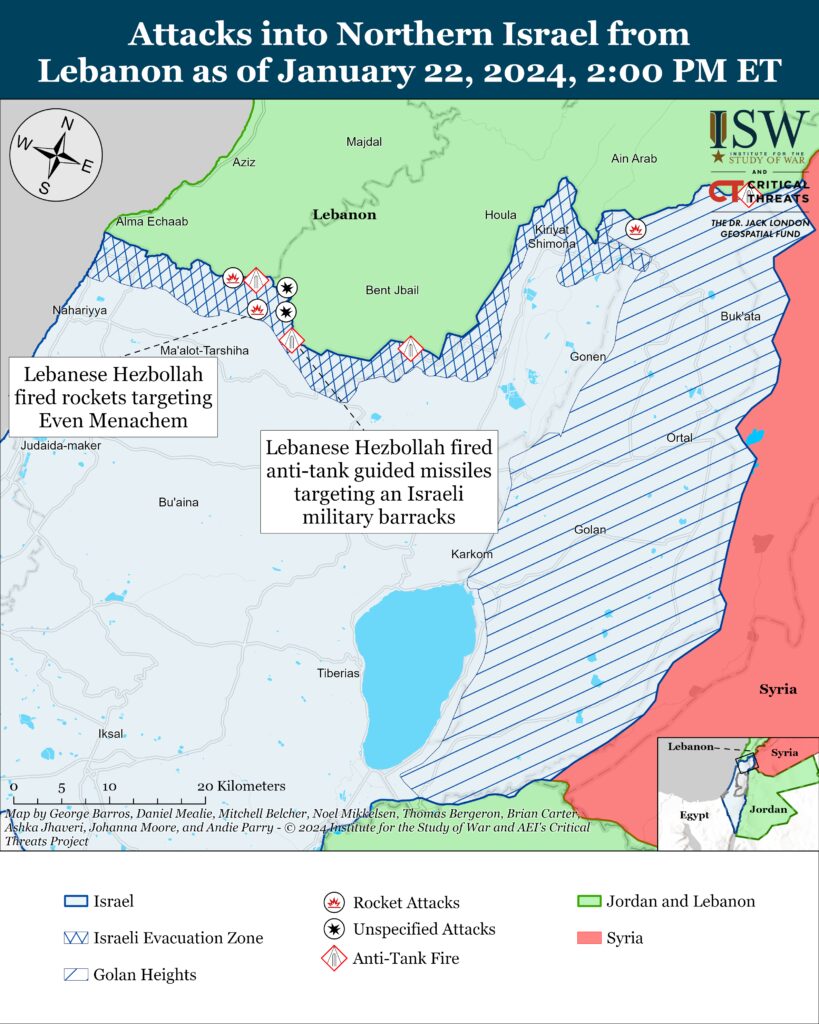
Recorded reports of attacks; CTP-ISW cannot independently verify impact.
Iran and Axis of Resistance
Axis of Resistance campaign objectives:
Demonstrate the capability and willingness of Iran and the Axis of Resistance to escalate against the United States and Israel on multiple fronts
Set conditions to fight a regional war on multiple frontsThe Islamic Resistance in Iraq—a coalition of Iranian-backed Iraqi militias—claimed responsibility for three attacks targeting US positions in Syria and Iraq on January 22.[xxxiii] The group fired two barrages of rockets targeting US forces at the Conoco Mission Support Site in Deir ez Zor Province.[xxxiv] The group separately claimed a drone attack targeting US forces at Ain al Asad airbase in western Iraq.[xxxv] The drone attack is the first on Ain al Asad airbase since the Islamic Resistance in Iraq fired multiple ballistic missiles at the base on January 20. The missile strikes injured US and Iraqi service members.[xxxvi]
The US Department of the Treasury’s Office of Foreign Assets Control sanctioned Iraqi airline Fly Baghdad for aiding the Islamic Revolutionary Guard Corps Quds Force (IRGC-QF) and its militias in Iraq, Syria, and Lebanon on January 22.[xxxvii] The Department of the Treasury stated that Fly Baghdad has carried weapons and military personnel to the Damascus International Airport for a range of Iranian-backed groups over the past several years. Fly Baghdad has supplied these groups with Iranian-made Fateh missiles, Zulfiqar missiles, al Fajr rockets, as well as AK-47s, RPG-7s, grenades, and machine guns. Kataib Hezbollah and Asa’ib Ahl al Haq used the airline to transport fighters, weapons, and US currency to Lebanon and Syria.
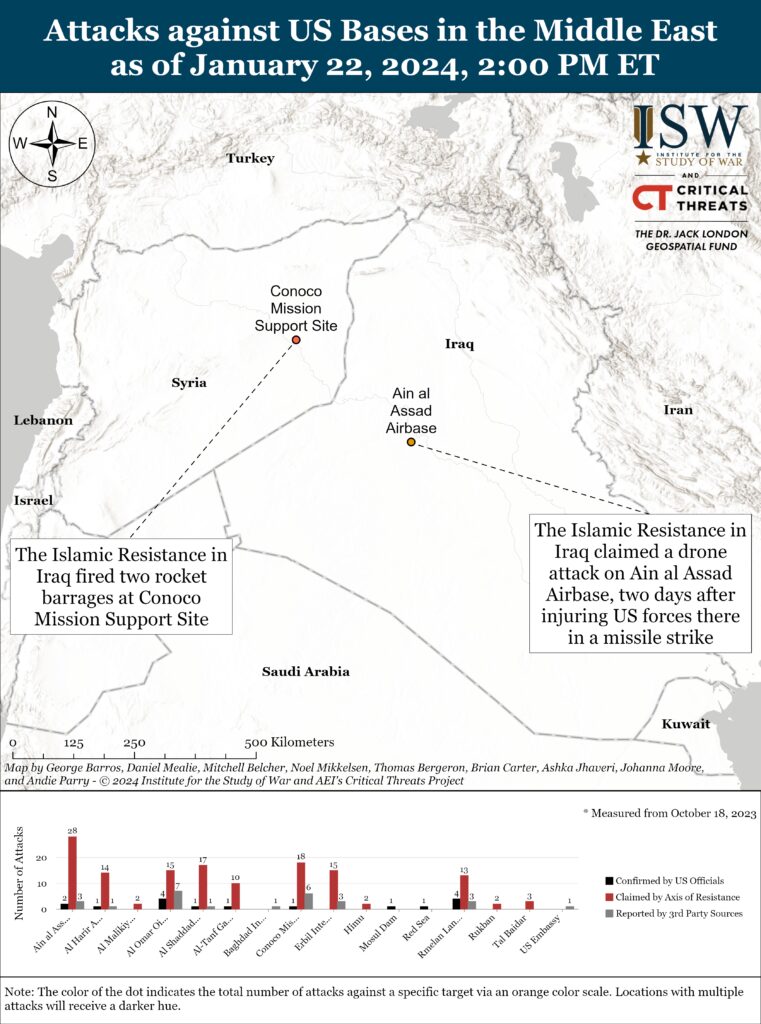
The Houthis claimed that they conducted a missile attack targeting an American military cargo ship in the Gulf of Aden on January 22. The group claimed to fire missiles at the US-flagged heavy load carrier Ocean Jazz but did not state whether they hit the vessel.[xxxviii] Shipping monitors did not report an incident in the Gulf of Aden on January 22 and unidentified US defense officials said the Ocean Jazz was not targeted by the Houthis.[xxxix] The group’s military spokesperson threatened that the Houthis intend to respond to US and UK strikes on Houthi naval missiles and other military targets in Yemen.[xl]
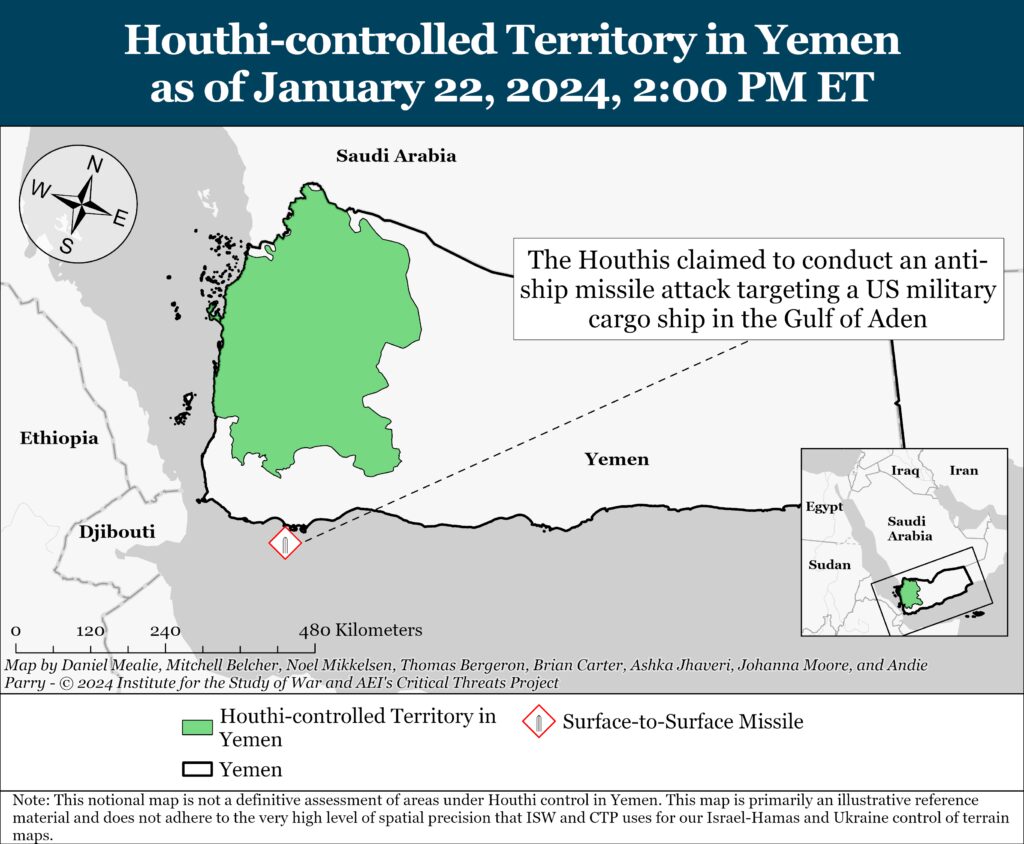
EU member states “agreed in principle” to deploy military assets to protect merchant shipping in the Red Sea on January 22.[xli] The German outlet Der Speigel citing unspecified diplomats reported that the EU-led operation will ”ideally start next month” and will involve sending European warships and early warning systems to the region.[xlii] The planned operation does not include participation in US strikes against Houthi targets in Yemen.[xliii] EU Foreign Affairs Representative Josep Borrell said after a meeting with European foreign ministers that the operation’s details still require unanimity.[xliv] The Houthi military spokesperson said on January 22 that the group would target all threats in the Red Sea and Gulf of Aden. The Houthis would likely interpret the EU‘s protection of merchant shipping as a threat to its anti-shipping campaign. Italy, France, and Spain did not join the US-led Operation Prosperity Guardian in December, despite a contradictory announcement from the US Defense Secretary.[xlv]
The Houthis are seeking new weapons from Iran, according to a January 21 report by Politico. Politico cites US and Western intelligence that the Houthis are lobbying Iran for additional weapons needed to launch missiles at freighters.[xlvi] US naval forces seized an illegal shipment of Iranian-made ballistic and cruise missile components en route to Yemen on January 11.[xlvii] Iran’s provision of these kinds of weapons to the Houthis enables their attacks on international shipping around the Red Sea. Houthi Supreme Leader Abdulmalik al Houthi claimed on January 21 that US strikes on the Houthis will develop the group’s military capabilities, instead of degrading the Houthi’s military capacity to target global shipping routes.[xlviii]
The Islamic Revolutionary Guards Corps (IRGC) held a funeral ceremony in Tehran on January 22 for three IRGC Quds Force officers that Israel killed in Syria.[xlix] The IRGC announced on January 20 that Israel killed five IRGC officers in an airstrike on al Mazzah, Damascus.[l] Among the killed were Brigadier General Sadegh Omid Zadeh, who was the IRGC Quds Force’s intelligence deputy in Syria, and his deputy, ”Haj Gholam.”[li] Omid Zadeh, also known as Hojjat Ollah Omidvar and ”Hajj Sadegh,” was reportedly an adviser to former IRGC Quds Force Commander Major General Qassem Soleimani and responsible for directing Iranian-backed militias in Syria to conduct attacks against US forces.[lii] High-ranking IRGC officials, including IRGC Commander Major General Hossein Salami, attended the ceremony.[liii]
Iranian officials and state media vowed retaliation against Israel for killing the five IRGC officers.[liv] Israel previously conducted strikes targeting senior IRGC officers involved in transferring military equipment to Lebanese Hezbollah through Syria on December 2 and 25, 2023.[lv] Israel was responding to Iran accelerating its supply of military equipment to Hezbollah, which is using the equipment to support attacks into northern Israel.[lvi]
An Iranian soldier shot and killed five fellow soldiers at an Artesh military facility near Kerman on January 21.[lvii] The Artesh is Iran‘s conventional military and is separate from the IRGC. The Artesh Southeastern Regional Headquarters commander said that the Artesh and Law Enforcement Command arrested and interrogated the individual. Parliament Speaker Mohammad Bagher Ghalibaf said that the incident was not terrorism.[lviii] Iranian officials and state media have provided no further information on the individual and his motive at the time of writing.
The Iranian and Pakistani foreign affairs ministries announced on January 22 that the two countries plan to renormalize diplomatic relations.[lix] Iran conducted drone and missile strikes on Salafi-jihadi, Baloch militant headquarters inside Pakistan on January 16.[lx] Pakistan recalled its ambassador and expelled the Iranian ambassador on January 17. Both sides adopted de-escalatory rhetoric following the strikes.[lxi] Iranian Foreign Affairs Minister Hossein Amir Abdollahian discussed the renormalizing diplomatic ties and his upcoming visit to Pakistan on January 29 during a phone call with his Pakistani counterpart before the foreign affairs ministries’ announcements on January 22.[lxii] Pakistan responded by conducting strikes on Baloch separatists inside Iran on January 17.[lxiii] Ambassadors from both countries will return to their posts on January 26.[lxiv]
Iranian Foreign Affairs Minister Hossein Amir Abdollahian discussed the Israel-Hamas war with the Kuwaiti Parliamentary Friendship Group head in Tehran on January 22.[lxv] Abdollahian praised Kuwait for its position in support of the Palestinian people and claimed that Israel is attempting to compensate for its failures in the Israel-Hamas war by resorting to acts of “blind” terrorism.
Abdollahian discussed the Israel-Hamas war with Algerian Parliament Deputy Speaker and Algerian-Iranian Parliamentary Friendship Group head Moussa Kharfi in Tehran on January 22.[lxvi] Abdollahian thanked Algeria for its support of the Palestinian people and emphasized that the Palestinian issue is of strategic importance to Algeria.
 Eurasia Press & News
Eurasia Press & News
